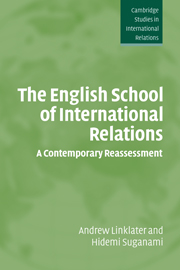Book contents
- Frontmatter
- Contents
- Acknowledgements
- Introduction
- 1 The idea of ‘the English School’ as a historical construct
- 2 The argument of the English School
- 3 The English School on ‘International Relations as an intellectual pursuit’
- 4 Progress and its limits: system, society and community in world politics
- 5 Cosmopolitanism and the harm principle in world politics
- 6 The sociology of states-systems
- 7 The good international citizen and the transformation of international society
- Conclusion
- Bibliography
- Index
- CAMBRIDGE STUDIES IN INTERNATIONAL RELATIONS
2 - The argument of the English School
Published online by Cambridge University Press: 22 September 2009
- Frontmatter
- Contents
- Acknowledgements
- Introduction
- 1 The idea of ‘the English School’ as a historical construct
- 2 The argument of the English School
- 3 The English School on ‘International Relations as an intellectual pursuit’
- 4 Progress and its limits: system, society and community in world politics
- 5 Cosmopolitanism and the harm principle in world politics
- 6 The sociology of states-systems
- 7 The good international citizen and the transformation of international society
- Conclusion
- Bibliography
- Index
- CAMBRIDGE STUDIES IN INTERNATIONAL RELATIONS
Summary
There are three basic and inter-related orientations in the English School's investigations into world politics. They may be labelled ‘structural’, ‘functional’ and ‘historical’. Manning's The Nature of International Society (1975), James' Sovereign Statehood (1986a), and parts of Bull's The Anarchical Society (1977) are examples of the first type. Their main contributions are in the identification of the institutional structure of contemporary international society. The second type is illustrated by parts of Bull's The Anarchical Society, which added to a structural study an extended investigation into the workings and relative merits of the existing institutional structure. Vincent's Nonintervention and International Order (1974) and Human Rights and International Relations (1986a) also fall into this second category, although in the latter Vincent's focus has shifted from the instrumental to the more explicitly ethical. The third type advances the study of the historical evolution of the institutional structure of international relations. Wight's Systems of States (1977), Bull and Watson's The Expansion of International Society (1984), Gong's The Standard of Civilization in International Relations (1984), and Watson's The Evolution of International Society (1992) exemplify this type of study. Among the more recent works, Wheeler's Saving Strangers (2000) and Jackson's The Global Covenant (2000) are notable contributions to the second type of inquiry as Buzan and Little's International Systems in World History (2000) is to the third.
- Type
- Chapter
- Information
- The English School of International RelationsA Contemporary Reassessment, pp. 43 - 80Publisher: Cambridge University PressPrint publication year: 2006



